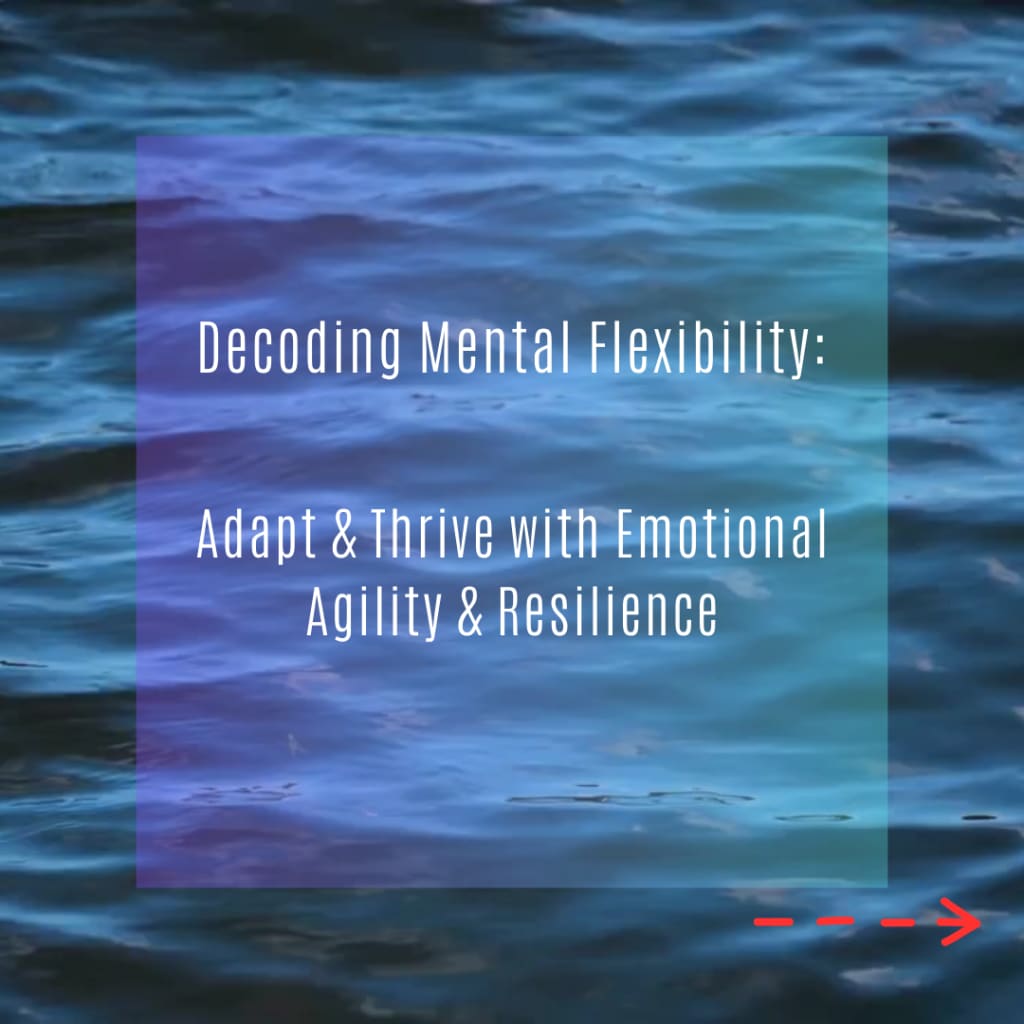Mastering Adaptability: Strategies for Enhancing Emotional Agility & Building Resilience.
Empower Yourself with Tools for Emotional Intelligence, Self-Regulation, And Growth Mindset by Decoding Mental Flexibility.

Mental flexibility is the cornerstone of improving mental health. But what exactly does it entail?
In the complex landscape of mental health, one trait stands out as a fundamental cornerstone — Flexibility. The theory posits that at the core of mental health lies flexibility. A healthy individual who possesses flexibility in the psyche allows for growth and resilience. Many factors contribute to flexibility in the psyche. However, adaptability stands out as a key component of flexibility in the psyche. It’s the secret sauce for navigating life’s twists and turns with grace.
Understanding Adaptability
Embracing adaptability means being open to change, willing to learn from new experiences, and ready to adjust our mindset when needed. By cultivating this trait, we can enhance our mental well-being and thrive in the face of challenges. Remember, being adaptable doesn’t mean compromising your values or beliefs; it means being versatile and resourceful in the face of adversity. Cultivate a mindset that adapts to challenges, embraces change, and nurtures inner strength.
Developing Self-Awareness
Self-awareness and awareness of others are crucial aspects of flexibility in the psyche. They enable us to understand our own thoughts, emotions, and behaviors, as well as empathize with the perspectives and feelings of those around us. This heightened awareness fosters better communication, deeper connections, and more effective problem-solving skills. By fostering self-awareness, individuals can better regulate their emotions and navigate social interactions with greater ease.
Breaking Free from Stagnation
Don’t get stuck in a rut! Flexibility is your ticket to breaking free from monotony and embracing change. Engaging in novel problem-solving means approaching challenges with an open mind, exploring various solutions, and being willing to adapt and innovate when necessary. By avoiding the trap of getting stuck in a single solution, we can embrace creativity, resilience, and growth. As Dr Ramani said, “It’s the ability to engage in novel problem solving and not to get stuck in a single situation.”.
The Art of Self-Regulation
Learn the art of self-regulation and self-soothing. Self-regulation and self-soothing are essential components of flexibility in the psyche. These abilities empower us to manage our emotions, navigate stress, and maintain inner balance amidst life’s ups and downs. By honing these skills, we can cultivate emotional resilience, cope effectively with disappointments, and bounce back from setbacks with strength and grace.
Building Coping Mechanisms
Cultivate coping mechanisms and resilience for stable mental well-being. Flexibility in the psyche is not about blindly going along with anything; it’s about having the capacity to adapt, regulate our responses, and find healthy ways to soothe ourselves during challenging times. Embracing this mindset fosters coping mechanisms, resilience, and a deeper sense of inner stability. By developing coping strategies, individuals can better navigate adversity and emerge stronger from difficult situations.
Embracing Resilience
Remember, being adaptable doesn’t mean compromising your values or beliefs; it means being versatile and resourceful in the face of adversity. “There’s a lot of coping and resilience in that flexibility.” In other words, flexibility is not about being down for anything or bending until you break. It’s about resilience and coping, about bending so you can bounce back stronger.
Prioritizing Mental Well-being
Let’s prioritize our mental well-being by fostering flexibility in our thoughts, emotions, and actions. By embracing flexibility, individuals can cultivate emotional agility and build resilience to navigate life’s challenges with grace and determination.
Conclusion
In conclusion, mastering adaptability is key to enhancing emotional agility and building resilience. By decoding mental flexibility, we empower ourselves with tools for emotional intelligence, self-regulation, and a growth mindset. Embrace change, cultivate self-awareness, and learn to navigate life’s challenges with grace. Your mental well-being deserves nothing less than your commitment to flexibility and resilience.
About the Creator
Lady Lavinia Dasani
Entrepreneur and small business owner.
Founder/CEO of Plumitif Press, LLC & Plumitif Empowerment Academy
I have a passion for writing, reading and helping others. I like sharing what I learn along the whirlwind adventure that we call life.






Comments
There are no comments for this story
Be the first to respond and start the conversation.